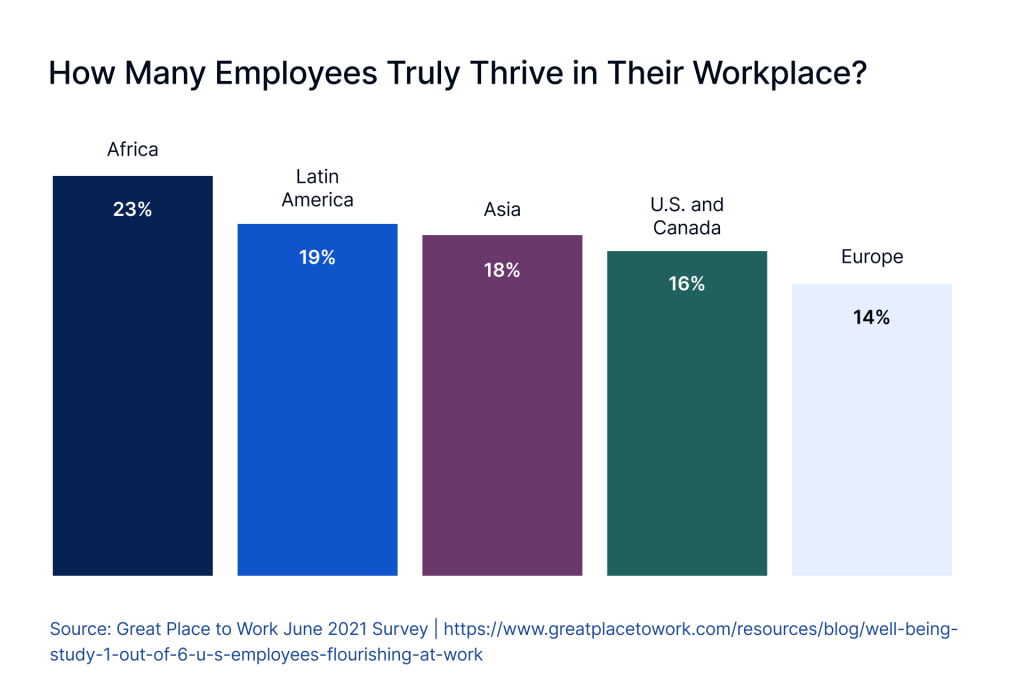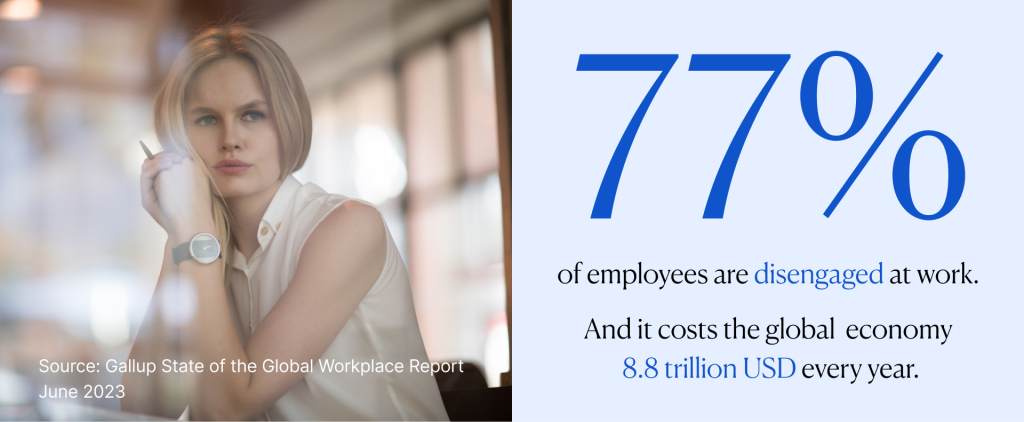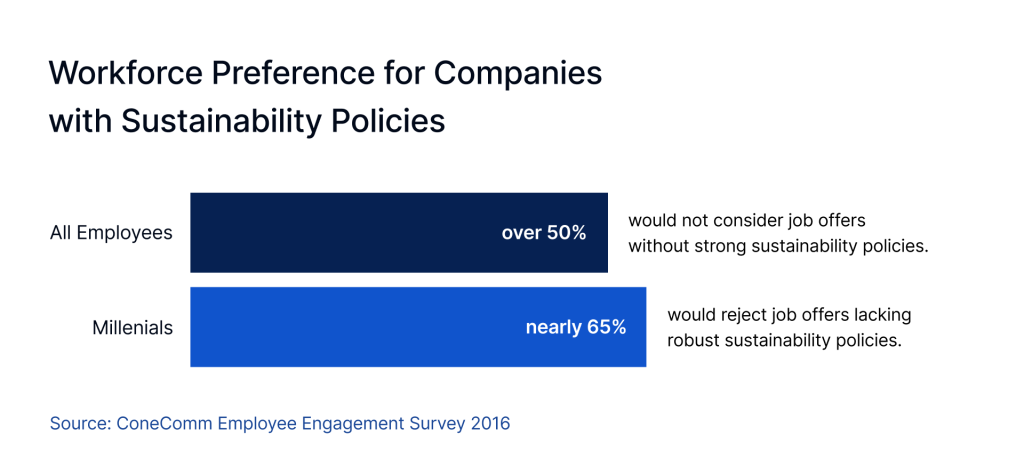
Globally, on average, just 18% of employees truly thrive in their workplace. Sustainability is the key to greater employee happiness and business success.

Businesses have been scratching their heads over how to tap into their workforce’s full potential since the dawn of office pizza parties. We know that happier employees lead to better business outcomes, but creating happy workforces hasn’t always been a straightforward or easy task.
In 1994, nearly thirty years ago, we started to get a better idea of what makes businesses good global citizens. John Elkington shook up the old “bottom line” thinking and introduced the Triple Bottom Line. His idea? Don’t just chase profits; consider the planet and your people too.
Elkington was a visionary who believed that prioritizing people and the planet could lead to increased employee well-being, more satisfied stakeholders, larger profit margins, and enhanced business success. And in 2023, we know he was right.
How Does Sustainability Change Employee Behavior?
Before Elkington introduced the Triple Bottom Line, most companies only cared about their shareholders. But as awareness around corporate responsibility and sustainability grew, businesses began to realize they needed to create value for a broader range of stakeholders, including their employees.
Not every business that has invested in sustainability has done so just because it’s the right thing to do. Other forces are at play. Seventy-eight percent of investors have made it clear they want companies to invest in Environment, Social, and Governance (ESG) improvements, even if it means sacrificing short-term profits.
Plus, about 29 countries have enacted laws mandating companies to provide ESG disclosures, and these laws are getting stricter by the day. From 2024 onward, the EU’s Corporate Sustainability Reporting Directive (CSRD) will impact approximately 50,000 businesses, including non-EU companies with subsidiaries in the EU or those listed on EU-regulated markets.
It’s obvious that the business world is in the midst of a transformation, and it’s not just businesses that have changed with the rise of sustainability; employees have evolved for the better. A culture of sustainability can influence how employees behave. Some of the most beneficial changes include:
1. A Greater Sense of Purpose and Enhanced Job Satisfaction
Roughly 13% of employees feel positively about their workplaces, leaving 87% dissatisfied with their jobs. This is concerning because people spend nearly a third (29.4%) of their lives at work, assuming a 50-year career. But sustainability can help. Unilever demonstrated this by achieving an 80% employee engagement rate.

How does sustainability boost job satisfaction? It gives employees a sense of purpose. Around 74% of employees find their jobs more fulfilling when they can make a positive impact on environmental and social environmental issues. This isn’t surprising given that 96% of millennials are concerned about the environment.
2. Increased Happiness
There’s also evidence that sustainable companies have happier employees. Measuring happiness is a tricky endeavor, but some companies have been willing to try. One study found that 93% of employees working in an “environmentally friendly office” feel happier in their jobs. Notably, this effect is observed solely with green office design. It’s reasonable to assume that this effect is even stronger when a company’s operations are environmentally friendly too.
3. Improved Motivation and Productivity
When employees become dissatisfied and disengaged, their productivity suffers. In fact, disengaged employees lead to 8.8 trillion USD in lost productivity on a global scale every year. But there is a solution to this. Research has found that employees who work for companies that prioritize sustainability and have green practices are 16% more productive than their counterparts at less sustainably-minded companies.

4. Reduced Attrition and Turnover
It should come as no surprise that employees at sustainable companies are less likely to seek greener pastures. Seventy percent of employees say they would be more loyal to a company that helps them contribute to important issues like environmental sustainability or social matters.
Patagonia, an outdoor clothing retailer, is perhaps the best example of how conducting business with sustainability in mind can reduce attrition and turnover. Patagonia is committed to causing zero harm, and as a result, its loyal and devoted employees experience only a 4% turnover rate.
5. Improved Health and Well-Being
Only 63% of workers rate their physical well-being as “excellent” or “good,” while just 58% say the same about their mental well-being. These subpar health conditions are a result of various global issues, including wealth inequality, limited opportunities, environmental pollution, and corporate neglect.
But sustainable business practices can be a game-changer for the well-being of your workforce. In a recent survey, more than half (58%) of employees said that a health-conscious and sustainable workplace culture had a significant positive impact on their mental health.
Leading by example is the key to success when it comes to using sustainability to improve employee well-being. Business leaders who walk the talk set the stage for a healthier work environment. This results in more loyal employees, reduced staff turnover, and heightened employee productivity. The power of this approach is that it resonates with climate-conscious staff and empowers them. Workplaces actively involved in climate initiatives and community clean-ups make employees feel like they’re actively protecting their local ecosystem.
But the benefits go further. Eco-friendly operations can significantly boost physical well-being as well. Consider the example of the Ambrose Hotel in Santa Monica, California, for instance. By making the switch from chemical cleaners to non-toxic, green products, they witnessed a tangible improvement in their employees’ physical health. This transition translated to fewer headaches, allergies, and sick days among their housekeeping staff.
Research indicates that every dollar saved in healthcare costs translates to a 2.30 USD increase in performance and productivity for employers. That means when sustainability leads to better employee health, it’s a win-win situation for everyone.
6. Increased Talent Attraction
At Patagonia, the outdoor clothing manufacturer we mentioned earlier, they receive an astonishing number of job applicants for every job opening, with an average of 9,000 eager applicants vying for each position at this environmentally conscious company. What’s driving this surge in interest? Well, it turns out that 71% of job seekers place a premium on a company’s environmental track record when they’re deciding on a potential employer.
But that’s not all. More than half of the workforce won’t consider working for a company that lacks strong policies addressing social and environmental sustainability issues. Even more striking, nearly two-thirds of millennials won’t even entertain job offers if their prospective employers don’t have robust corporate social responsibility policies in place. Sustainability efforts also extend their reach into employee networking, with 92% of employees at companies with a strong sense of purpose being more inclined to recommend their employers to job-seekers in their own network.

How to Create a Happier, Healthier, and More Profitable Workforce
Without employees, businesses are nothing. Knowing how to influence employee behavior for the better can mean the difference between unprecedented business success and a failing business.
To harness the full potential of sustainability to improve your workforce’s mindset and behavior, you need leaders who understand the importance of sustainability and Environmental, Social, and Governance (ESG) leadership and endorsement. That’s where we come in.
We can assist you in identifying, attracting, and retaining top executives committed to driving your sustainability initiatives. Our approach aligns your leadership with your sustainability goals and ensures a harmonious blend of purpose and profit.
Our approach aligns your leadership with your sustainability goals and ensures a harmonious blend of purpose and profit.
By integrating sustainability into your leadership strategy, you can transform your company culture, enhance employee well-being, and boost productivity while attracting top talent. Click here to contact one of our consultants.
About the Authors
Christian Ehl is a Partner at Stanton Chase Düsseldorf and the Global Practice Leader of Stanton Chase’s Sustainability and ESG Sector. He has 19 years of experience in executive search, leadership advisory, sustainability, and ESG.
Christian’s work is specially concentrated on aiding companies that are undergoing a shift towards sustainable and ESG-compliant business models. The extensive insights Christian has amassed over the past decade in areas connected to sustainability significantly assist him in this undertaking.
Tina Mavraki, CFA is a member of Stanton Chase’s Sustainability and ESG EMEA Region Advisory Board. She is a Non-Executive Director and Strategic Advisor with a unique blend of capital markets and ESG integration experience.
How Can We Help?
At Stanton Chase, we're more than just an executive search and leadership consulting firm. We're your partner in leadership.
Our approach is different. We believe in customized and personal executive search, executive assessment, board services, succession planning, and leadership onboarding support.
We believe in your potential to achieve greatness and we'll do everything we can to help you get there.
View All Services